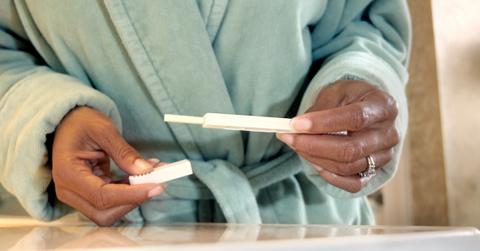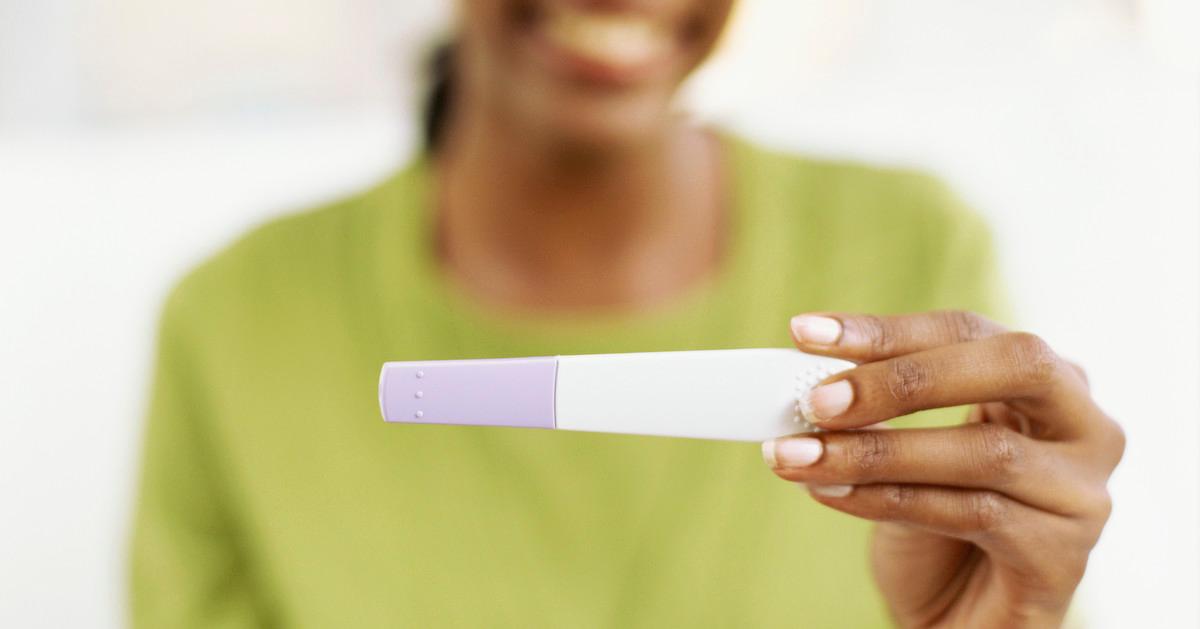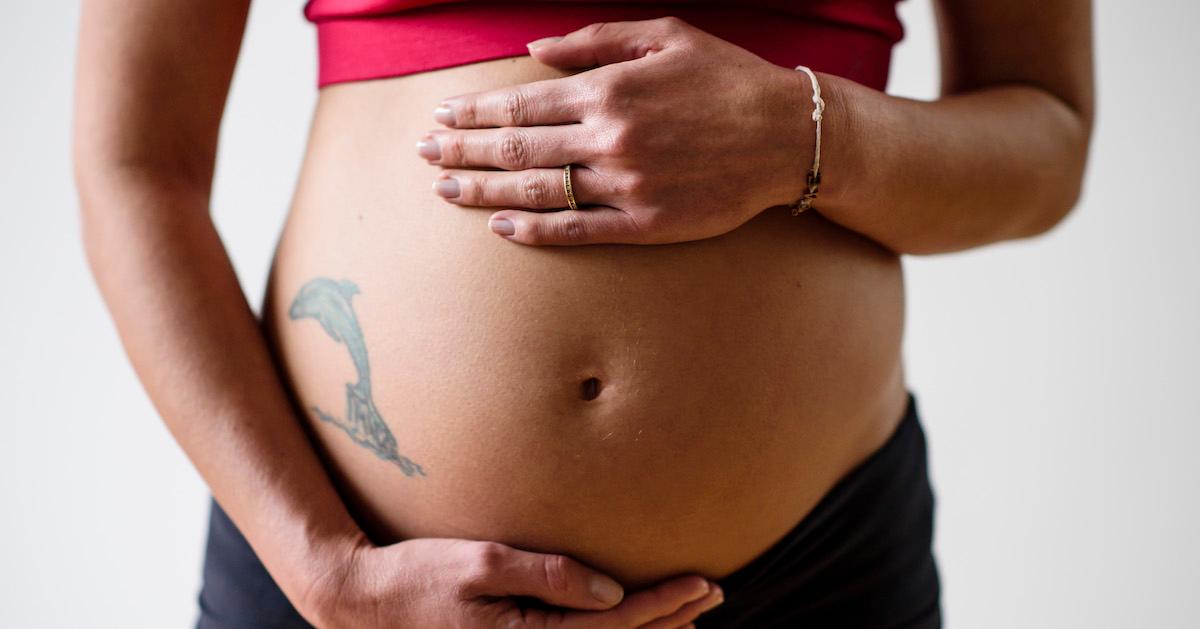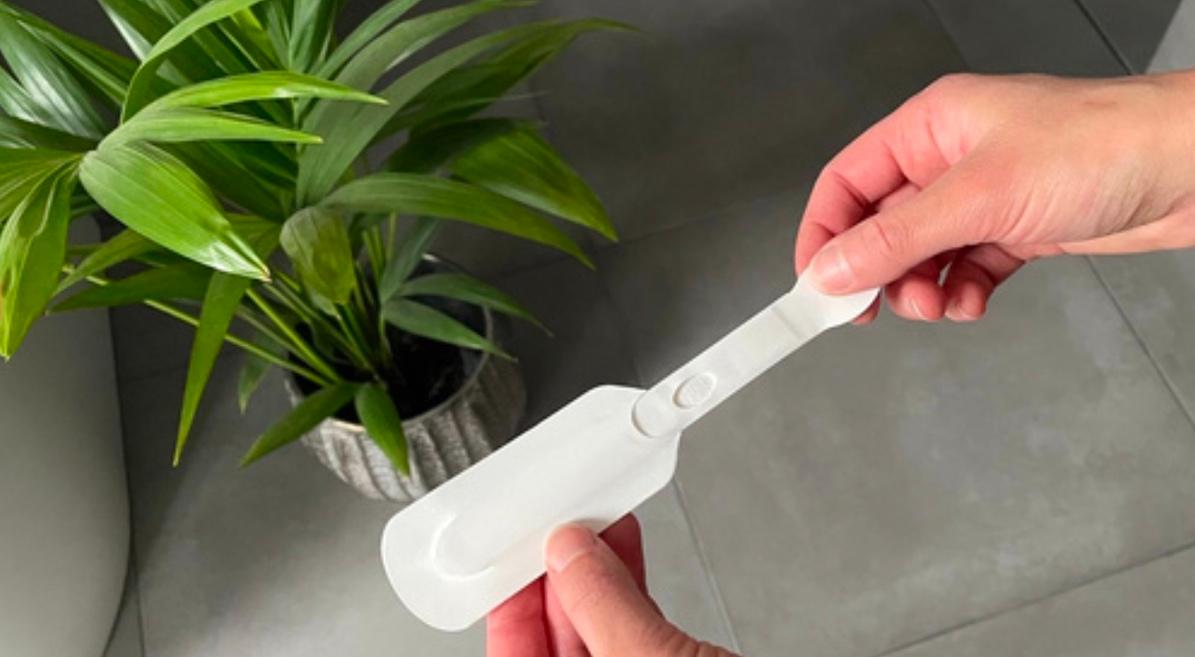Are Pregnancy Tests Vegan? Why It Doesn't Really Matter
Updated June 19 2023, 10:20 a.m. ET

No matter how long you’ve been vegan, it’s always a bit shocking to find out that yet another random, common item contains animal byproducts. And one controversial TikToker's refusal to use pregnancy tests had her followers wondering if pregnancy tests are vegan.
In one way, the answer is complicated — in another, the answer doesn’t really matter at all. Here’s a look into whether pregnancy tests are vegan or cruelty-free, our recommendations of eco-friendly pregnancy and ovulation tests, and TikTok mom Alice Bender's questionable thoughts on the matter.
Are pregnancy tests vegan?
Pregnancy tests typically are not classified as vegan — but that doesn’t mean vegans shouldn’t use them anyway. Let us explain.

For an item to be classified as vegan or vegan-friendly, it would have to be free of animal products and animal-derived materials. Typically, at-home pregnancy tests are made with monoclonal antibodies, which are derived from an animal (typically mice or goats) in a lab. A pregnant person’s urine contains a hormone known as hCG, and when hCG binds with the monoclonal antibodies on the stick, it presents a positive result, as explained by The BBC.
Doctors can also execute pregnancy tests with either a urine or blood sample. However, a blood test is also known as a “serum monoclonal antibody pregnancy test,” according to a 1998 study by Am Fam Physician, meaning the blood test that doctors perform likely uses animal antibodies as well.
Not only do these blood tests take longer to get results than urine tests, but they also require paying for a doctor’s visit that, if the patient is not actually pregnant, may not really be needed. A store-bought pregnancy test can be a quick and fairly affordable way to determine pregnancy — and if it is positive, the next step would be making a doctor’s appointment.
So, because pregnancy tests contain animal-derived monoclonal antibodies, they cannot be labeled as vegan.
All that being said, pregnancy tests are a medical device. If someone suspects they may be pregnant, the Cleveland Clinic recommends taking a pregnancy test at least 10 days after conception or after a missed period, so they can start prenatal care as soon as possible.
Veganism, as defined by the Vegan Society, is a lifestyle that “seeks to exclude — as far as is possible and practicable — all forms of exploitation of, and cruelty to, animals.” Refusing to take a pregnancy test because it includes animal-derived antibodies is not practical, and it may even be an unwise medical decision. The same thing goes for medications, most of which must legally be tested on animals. It's unfortunate that this is how it's done, but refusing to take necessary medicine or a pregnancy test on these grounds is dangerous.
If you are vegan and need to know if you are pregnant, take the test. You will still be vegan. We don’t live in a vegan world, and until a fully vegan pregnancy test hits the market, the best way to take care of your health is to use the resources that exist.
And speaking of that, a vegan pregnancy test is finally in the works!

A German startup is working on the first vegan pregnancy test.
Phaeosynt, a Germany-based startup, is "working on the first vegan pregnancy test," CCEO & Co-Founder Stephanie Pfeil-Coenen tells Green Matters in an email.
Specifically, Phaeosynt is developing vegan antibodies from diatoms, which are single-celled algae. The company's diatoms (Phaeodactylum) only need salt water, light, and oxygen to grow; and they can be grown at room temperature, as opposed to animal cells, which require heat to grow.
Additionally, Phaeosynt's production of antibodies is "efficient, stable in quality, and inexpensive."
"We therefore need fewer resources, have an energy advantage, and work completely animal-free," Phaeosynt stated in a press release sent to Green Matters. "Phaeosynt has not only a vegan alternative with the production of antibodies in diatoms, but also a more sustainable alternative."
The company plans to use its diatom-derived antibodies to create the first vegan pregnancy test. And to make the test as eco-friendly as possible, the company plans to use recycled paper for the test's casing, rather than plastic.
"At Phaeosynt, we want to revolutionize the antibody market and follow the 2020 recommendation of the EU reference laboratory (EURL ECVAM) to eliminate the use of animals in antibody production," the company stated. "Our vegan pregnancy test is the beginning of animal-free and more sustainable diagnostic products."
As of June 2023, Phaeosynt plans to launch its vegan pregnancy test in 2025.

A prototype of a Phaeosynt pregnancy test
These are the best eco-friendly pregnancy and ovulation tests on the market.
Even though pregnancy tests do use animal antibodies (the same typically goes for ovulation tests) there are a few brands making efforts to make their tests as eco-friendly as possible.
The standout brand is Lia, which started selling its compostable and flushable pregnancy tests online in March 2021, after years of R&D. However, as of publication, the brand appears to be out of business, at least temporarily. The company did not respond to Green Matters' request for comment.
Another option is SolCraft Medical, which makes both pregnancy and ovulation tests. They are both composed of more than 90 percent biodegradable materials, packaged in recycled and recyclable cardboard packaging, and made in the U.S. SolCraft Medical claims to use a “humane” manufacturing process for its pregnancy and ovulation tests. “Antibodies harvested from animals living under conditions that exceed U.S. and EFSA standards for animal welfare,” the packaging reads.
Additionally, the brand Oova’s ovulation tests connect to a smartphone app to help make the process of tracking fertility easier. While Oova’s test strips do include animal antibodies, the company's CEO Amy Divaraniya tells Green Matters: "We do not do any sort of animal testing for our product or platform. All of our testing is done using female urine samples. We do not even use animal urine or synthetic urine during development."
The brand Hoopsy also makes somewhat eco-friendly pregnancy tests. The brand's midstream pregnancy tests are made from 99 percent paper, derived from responsibly managed forests, and packaged in 100 percent recyclable boxes. The company also claims that the test have over 99 percent accuracy.
Hoopsy is based in the U.K., and ships internationally. (The shipping fee to the U.S. is only $7).
TikTok mom Alice Bender brought attention to pregnancy tests not being vegan.
TikTok creator and young mom Alice Bender, known on the app as both @alicellani and @alicellanispam (and previously Alice and Fern) is often the subject of controversy. She regularly makes videos about her young son Fern, and she has been criticized for regularly going out in public barefoot, supposedly letting her toddler drink kombucha, having never used sunscreen on Fern, and much more.
In early 2022, Bender received flack for refusing to take a pregnancy test even when she suspected she was pregnant. She explained to her followers that ever since finding out that pregnancy tests use antibodies harvested from animals, she would no longer take them, since she lives a vegan lifestyle. “Next time we have a baby, we won’t know till it starts kickin’!” she wrote in a video in November 2021.
In January 2022, Bender confirmed that she was pregnant, based on developing a bump. She gave birth to a daughter in August of that year.
The results of a pregnancy test wouldn't have mattered to Bender anyway, because, as she told her followers, she had no plans to see any doctors during her pregnancy. She also delivered her daughter via a “freebirth,” aka unassisted birth, which is a birth without any medical professionals present.
This article, originally published on Jan. 12, 2022, has been updated to include information on Phaeosynt, Hoopsy, and updates on Alice Bender's family.